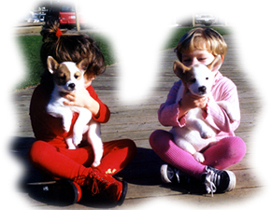
| A
Natural, Healthy Dog Diet Valhallasun Reg'D Kennels |
||||||||||||
|
||||||||||||
|
As
recommended by:
Veterinian FINN SMED, Rask Molle Dyrehospital, Denemark
|
|||||||||||||||||||||||||||||||||||||||||||
|
A Natural, Healthy Dog Diet |
|||||||||||||||||||||||||||||||||||||||||||
|
OVERALL MEAL PLAN
Number of meals for a dog:
A meal should be offered the dog only for a short period of time, such as 20 - 30 minutes. If the dog refuses the meal, it should be taken away (stored in the fridge till next meal time), and you should reduce the total number of meals you give the dog. If the dog eats everything, you should increase the amounts fed per meal. If the dog gains excess weight, you reduce the number of meals; if it becomes too skinny, you feed more per meal.
Number of snacks for a day is unlimited, but The dog should be allowed to rest for a couple of hours after each meal - no heavy exercise on a fully stomach! Fresh water should be available for the dog every day, also on fast days. A NATURAL MEAL Maximum - the eight should be raw meat (preferably tripe), but also Cooked meat can be served occasionally, yet uncooked meat is essential for the dog's metabolism and should never be less than - of the weight of the meal. Please note that no parasites can be transmitted to the dog from raw pork, beef, veal, lamb and seafood products! Dogs have no problem with cholesterol and should preferably have fat as their energy source, not carbohydrates. Products like milk, yogurt, cheese, and eggs are valuable as occasional supplement to the meat. Minimum - the weight should be raw vegetables (including fruit), such as: Vegetables and fruit should not be peeled: the most valuable nutrients are in the skin! Be aware thought that imported fruits and vegetables may contain uncontrolled amounts of herbicides in the skin Ð so such products should be peeled before serving. Vegetables may occasionally be cooked, by should preferably be served raw, since many essential nutrients are destroyed by cooking. Approximately - the weight should be grain products (including bread), such as: Bread should preferably be whole grain and dry, not fresh. Supplements to every meals: 1 - 2 spoonful vegetable oil, such as corn oil, sunflower oil, olive oil, or flax oil. _ - 1 vitabuns, bread slices, whole grain bread, crumbs, Mineral/herb supplement (Wolle's Horse-Power or similar) For puppies and dogs older than 7 - 8 years, 1-2 spoonful bone-meal per 30 kg body weight. PUPPY SUPPLEMENT Puppies should have one full natural meal per day - same recipe as for an adult dog, yet preferably ground or finely cut. The additional daily meals should be rich in animal fat, carbohydrates, and fibre with only limited amounts of additional protien. Examples could be If the puppy refuses a meal, you eliminate the lunch meal first, later the breakfast. WEEKLY SUPPLEMENT 1 - 2 big, uncooked, bones of beef, veal, pork, or horse. Please note: no poultry bones, and no bones with sharp cut edges (T-bone, ribs, etc.), expecially from cooked meat and fish. The bones should be so large that the dog cannot swallow them, and they should be partly eatable for the dog. Joints and neck bones are expecially suited. When the dog is given bones on a regular basis, the bone-meal supplement becomes redundant for dogs between 1 - 7 years. SNACKS Snacks should only be given as treats for work well done. Treats should be: Treats may be given on fast days, although the total amount should be kept low (less than 5% of a meal).
|
|||||||||||||||||||||||||||||||||||||||||||
|
|
|
|
|
|
|
| Menu
| History
| Standard
| Dog
Diet |
Photos-Puppies Photos-Adults | Photos-Judges | M+F | Forgotten Spitz Weather Working | Survey | Links | Contacts ||| |
All contents of this site © 1998-99 Valhallasun Reg'd Kennels.
All rights reserved.
